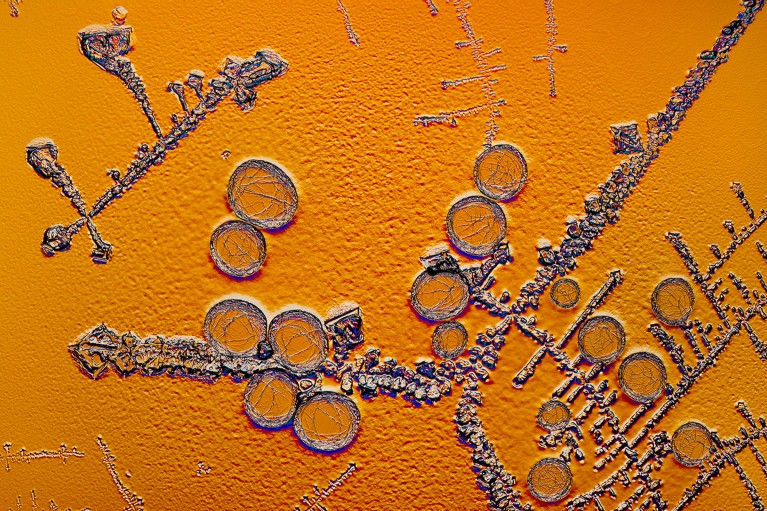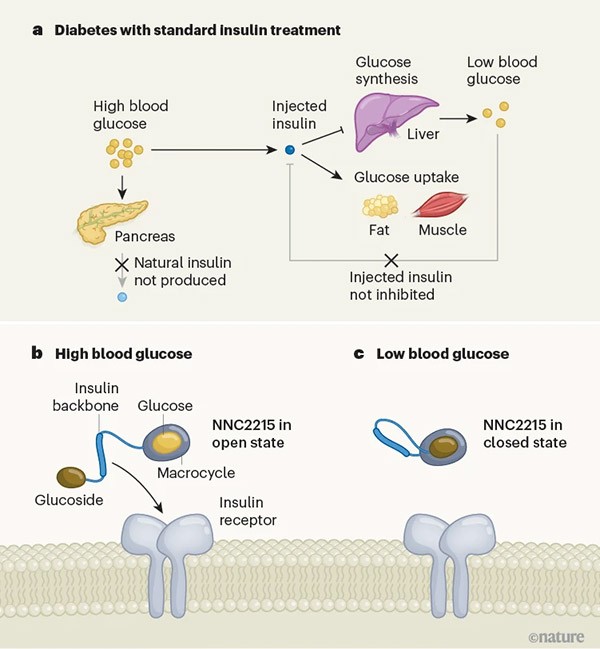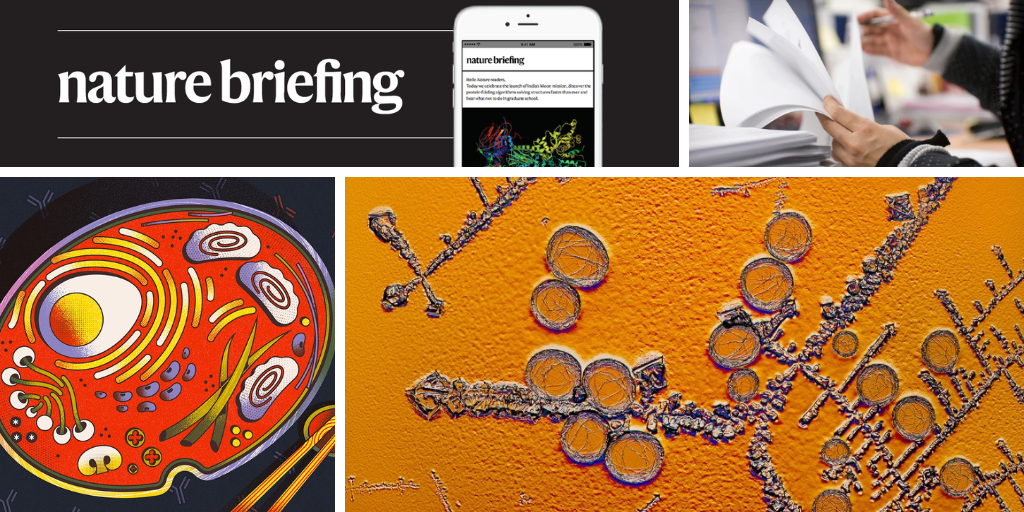Hello
Nature
readers, would you like to get this Briefing in your inbox free every day?
Sign up here
.

Crystals of insulin. A new kind of insulin can modify its activity in response to glucose levels in the blood.
Credit: Antonio Romero/Science Photo Library
Scientists have designed a form of ‘smart’
insulin that can switch itself on and off depending on blood-glucose levels
. The molecule is modified with a ‘switch’ that keeps it in a closed, inactive state when blood-glucose concentration is low. When glucose levels in the blood rise, the sugar changes the shape of the insulin so that it’s ‘turned on’. The insulin was as good as human insulin at reducing blood glucose in rats and pigs, without the drop to too-low levels that can come with current insulin treatments.

To reduce the harmful long-term consequences of high blood glucose in people with type 1 diabetes, insulin can be injected to lower blood glucose through uptake by fat and muscle tissue, and prevention of glucose synthesis by the liver (
a
). However, injected insulin remains active even once glucose levels are back to normal, potentially causing a drop to dangerously low levels. ‘Smart’ insulin, officially called NNC2215, is modified with a switch consisting of two parts: a ring-shaped structure known as a macrocycle and a glucoside, a molecule derived from glucose. When glucose levels in the blood rise, the sugar displaces the glucoside and changes the shape of the insulin so that it is turned on (
b
). When blood-glucose concentrations are low, the glucoside binds to the ring, keeping the insulin in a closed, inactive state (
c
). (
Nature News & Views | 7 min read
,
Nature
paywall)
A study of 19 people who received multiple vaccines against SARS-COV-2, and in some cases were infected by the virus, showed that they
failed to generate
certain antibody-producing cells called long-lived plasma cells
(LLPCs). This finding may explain why COVID-19 shots provide immunity for a few months at best, rather than for years or decades. “The bad news is the failure of SARS-CoV-2 mRNA vaccines themselves — with or without natural infections — to induce LLPCs in the bone marrow,” says immunologist Doan Nguyen. “The good news is this failure itself provides a research opportunity to find a way to change the fate of short-lived vaccines.”
Reference:
Nature Medicine
paper
A high-profile paper on how to achieve highly replicable papers in experimental psychology — by using what the authors called the most rigorous experimental conditions —
has itself been retracted
. Among other problems listed in the retraction notice, the study did not universally apply one of the key tenets of the process it advocated: preregistration, in which the goals of research are noted before the work is done to avoid the temptation to massage data into new conclusions. “It was just a screw up,” says open-science advocate Brian Nosek, who was among a minority of the paper’s authors who issued a rebuttal to other aspects of the retraction notice. “What this shows is that doing good science is hard, much harder than most people seem to think,” says visual neuroscientist Sam Schwarzkopf.
Reference:
Nature Human Behaviour
paper
(retracted)
Nature
’s news team, including this newsletter, is editorially independent of the
Nature
journals.
Most of the
meteorites that have fallen to Earth can be traced back to just three celestial bodies
. Based on their appearance and chemical composition, researchers created a meteorite family tree, sorting each small member into a group that broke away from a larger body. The trail leads back to a trio of bodies in our Solar System that shattered into families of asteroids that line the belt between Mars and Jupiter, small fragments of which sometimes make it down to Earth. “It feels like a lifetime discovery,” says astrophysicist and co-author Miroslav Brož.
Features & opinion
Innovative approaches to nutrition immunology are cutting through the hype to uncover how nutrition, immunity and disease are linked. It’s early days for the field, but with attention and funding growing, scientists are getting closer to unpicking
the elements of our diet that could help, or worsen, a range of health problems
, from cancers to immune conditions such as lupus. For example, findings that reveal the underlying mechanisms triggered by fasting could enable people to reap the benefits — without the downsides of actually going hungry
Despite there being more ongoing armed conflicts than at any time since the Second World War — and growing evidence that war has severe and long-lasting effects on biodiversity — governments and conservation organizations have been reluctant to explicitly address the issue in conservation policy, notes a group of researchers from the environment ministry of Ukraine, the non-profit Conflict and Environment Observatory, and the conservation charities ZSL and WWF Colombia. Decision makers are gathering in Colombia for the 16th meeting of the Conference of the Parties to the Convention on Biological Diversity (COP16), with one of the themes being
paz con la naturaleza
or ‘peace with nature’. Attendees should take this slogan to heart and place greater emphasis on
the impact of armed conflict on biodiversity, as well as conservation’s role in promoting peacebuilding
, say the authors.
Images from the James Webb Space Telescope are a portal to the past, allowing astrophysicists to study galaxies from the first billion years of the universe. These young galaxies
appear bigger and brighter than our current theories about the evolution of the universe say they should be
, leaving researchers to debate explanations for how these infant galaxies could have grown up so fast.
Today I’m stationing myself by the window to catch a glimpse of the ‘Hunter’s Moon’, October’s full moon, which will be the
brightest one of this year
. Don’t worry too much if you miss it, though: November’s full moon, the Beaver Moon, will also be unusually bright.
Let us know how we can make this newsletter shine brighter at
[email protected]
.
Thanks for reading,
Jacob Smith, associate editor, Nature Briefing
With contributions by Flora Graham and Sarah Tomlin
Want more? Sign up to our other free Nature Briefing newsletters:
•
Nature Briefing: Careers
— insights, advice and award-winning journalism to help you optimize your working life
•
Nature Briefing: Microbiology
— the most abundant living entities on our planet — microorganisms — and the role they play in health, the environment and food systems
•
Nature Briefing: Anthropocene
— climate change, biodiversity, sustainability and geoengineering
•
Nature Briefing: AI & Robotics
— 100% written by humans, of course
•
Nature Briefing: Cancer
— a weekly newsletter written with cancer researchers in mind
•
Nature Briefing: Translational Research
— covers biotechnology, drug discovery and pharma


